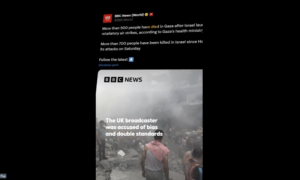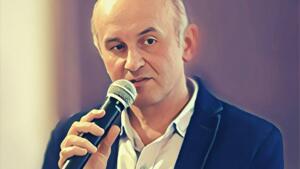Arriving at Samos was supposed to be a new beginning for the 25-year-old Afghani and his son. The man put their fate into the hands of smugglers and decided to head for Greece. This decision turned his life into a nightmare. His son drowned when their boat crashed on rocks off the coast. Greek authorities now threaten the mourning man with 10 years in prison for recklessly putting his son’s life in danger.
The most difficult decision
Samos. A beautiful island on the Aegean Sea. A true paradise for beach goers and a popular holiday destination. The island does have a dark side, however. Due to its close proximity to Turkey, the island is viewed by many refugees as the easiest gateway to Europe and, thus, to a better world. Many of them decide to make the difficult decision and depart on the dangerous journey across the sea. The island is supposed to be the first stop on the road to a dream life. But it is often the last one. [1]
The numbers speak for themselves. Between 2014 and 2020 more than 1.2 million refugees tried to cross the Aegean Sea. 2,000 of them drowned. [2] The 25-year-old Afghani with the initials N.A. wishes to remain anonymous. He also tried to make the difficult crossing to Greece – in November 2020.
“I was forced to do this”
N.A. escaped Afghanistan when he was just 9 years old. His asylum application was denied twice by Turkish authorities. The single dad feared that he and his son would get deported back to Afghanistan.
His son was N.A.’s entire world. The boy gave meaning to his life by being his only hope and source of motivation. The father wanted him to be able to write and read – something he himself has never been taught. The man tells us how his son always wanted to finally go to school and become a policeman. Ebrahim Haidiri, who accompanied N.A. during the journey, remembers the son as being an adorable and smart young man, who always liked talking with the smugglers. He also highlights the incredible bond that N.A. and his son shared. They were best friends.
Do you want to support creating reliable news on migration and refugees? Join the Salam Lab supporters! >>>
To ensure a better future for his child, the 25-year-old made the most difficult and the most important decision of his life. One that would change this life forever. “I didn’t come here for fun,” he recalls in an interview with the Associated Press, “I was compelled. I didn’t have another way in my life”. [3]
He got the smuggler’s number from his neighbour and together with 24 other people departed on the dangerous journey to seek for a better life in Greece.
The night when everything changed
It was a windy November night. A group of refugees leaves Izmir, a port city in western Turkey, in an inflatable boat of questionable quality. They are headed for Greece with no guides.
“I don’t know what the smugglers were thinking, leaving us in such a bad situation,” said Haidari, a refugee who made it to Samos safely [4]. The sea was very rough. People were panicking. They lost control over the boat, which was now taking water on. As soon as a strip of land appeared on the horizon, the frightened refugees headed straight for it. Unfortunately, the moment the inflatable boat reached the coast it broke and everyone fell overboard in a matter of seconds.
N.A. admits that he would have drowned if it weren’t for his life jacket. After realizing what had just happened, the father started looking for his son. He will never forget the crash and the moment when his son slipped out of his hands.
Rescue mission and the coast guard
The non-government organization Aegean Boat Report was contacted through WhatsApp by one of the migrants around midnight. They were informed about a boat full of people headed for Samos. The ABR reported this information to the coast guard immediately.
The crash victims recall that around 1 a.m. the guard appeared twice to search the waters. “Maybe they didn’t see us or didn’t want to help us,” said Haidiri. Greek authorities deny these allegations, claiming that after the report was made, the coast guard immediately went to the crash site to look for survivors, but didn’t manage to find anyone. The guards stress that the rescue mission was carried out professionally and with respect for human rights. [5]
A group of survivors managed to get out of the sea after a long struggle. N.A. recalls looking for his son for many hours. Unfortunately, to no avail. Hours were passing with no help in sight. Around 6 a.m. a group of ten survivors decided to travel deeper into the island to look for help.
The son is in a hospital
Around 6 a.m. the coast guard initiated a rescue mission and found the body of a dead boy – N.A.’s son’s. Less than an hour later they spotted a group of survivors, with the 25-year-old Afghani amongst them. The coast guard suggests the fact that N.A. was not found with his son is the main reason for him being charged. Supposedly he left his son to die.
After the group was found, N.A. was taken for a long interrogation. The coast guard told him that his son was well and recovering in a hospital. The good news helped the man get through the extensive interrogation. He was only allowed to contact the hospital after the fact. Then he was informed about his son’s death. “Why did they do this to me? They should not have done that. They should have told me the truth.” [6]
An appalling exception
N.A.’s attorney Dimitri Choulis, described the situation as unprecedented in Europe. He declared it an “appalling exception” and a “direct attack” on asylum seekers. He also commented on the mistakes made by the coast guard and the Greek government, as well as on the 5-year-old’s questionable necropsy report. Choulis adds that his client will be suing the coast guard. [7].
Lawyers and human rights activists defend the mourning father. They claim that charging him with a crime is a mere stunt to highlight Greece’s new anti-immigration policies or to distract the public attention from the coast guard’s possible mistakes. [8]
The Greek government denies the allegations against government services. Notis Mitarachi, Greece’s Minister of Migration and Asylum, claims that the charges have nothing to do with the country’s policies, as we are dealing with a loss of life. “The people who choose to get into unseaworthy boats driven by people with no experience of the sea, obviously put human lives at risk,” he said.
When will Americans leave Afghanistan? Will it cause another war in the region? >>>
Mitarachi claims to not understand why people would decide to risk their lives on such a dangerous voyage across the sea, with, according to the UE standards, Turkey being a perfectly safe country. [9]
This does not change the fact that this is the first time that charges have been brought in such a situation.
Life after the tragedy
N.A. will stay on Samos until his trial. He received temporary asylum in Greece and thanks to NGOs he also received shelter and the necessary support.
By losing his son, he also lost the will to live. The mourning father is struggling with suicidal thoughts. He gave everything away to ensure a brighter future for his son. Now he is facing the possibility of spending 10 years in jail for doing that.
He wanted to fulfil his son’s dream of going to school and becoming a police officer. N.A. recalls the moment their boat departed from Izmir. He remembers the passengers’ fear and uncertainty. The 5-year-old boy was very excited about his first sea voyage. His first and last. He will never go to school, nor will he ever wear a police uniform.
There is a small cemetery hidden amongst the beautiful landscapes of Samos. This is where many migrants rest after having lost their lives on the way to a brighter future. This is where N.A.’s son is buried. A small teddy bear leans against the tombstone that reads: “He drowned in a shipwreck. It wasn’t the sea, it wasn’t the wind, it was the policies and fear.” [10]
Let us never forget that somewhere between the policies, conflicts, and debates on the refugee crisis there are also real people and their true stories to be found and remembered.
Sources:
[1] Samos Volunteers, Situation on Samos,
[2], [3], [5], [6], [7] Associated Press, All my hopes were him: a migrant father’s plight in Greece,
[4], [9] Info Migrants, Afghan migrant, charged with endangering his son’s life in Greece, speaks out,
[8] The Guardian, Father faces criminal charge over son’s death in migrant boat tragedy,
[10] Ekathimerini, Migrant father charged with son’s death on journey to Greece.
translated by Justyna Siwiec – a philologist and a translator. Food and music lover interested in the history and culture of the Middle East. Salam Lab’s co-worker.



